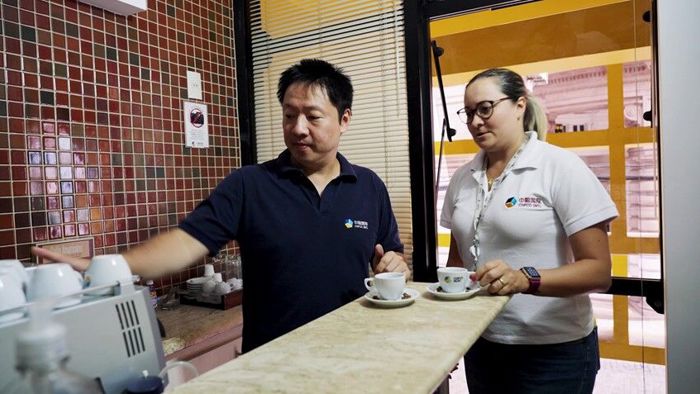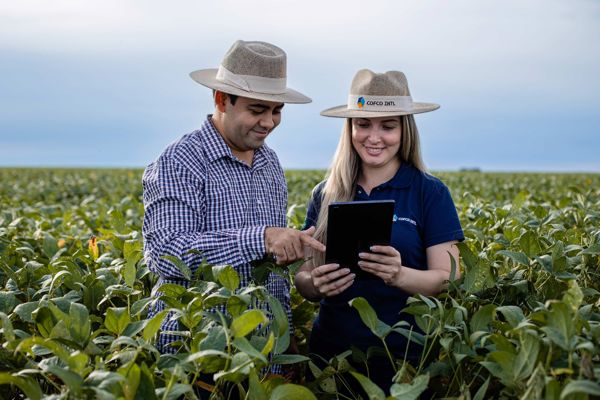
The coffee collective
Coffee when you wake up in the morning. Coffee with your colleagues. Tasting of coffees. For Alexandre Chen, trading coffee is a natural extension of his personal interest and passion.
The coffee collective
“My wife always tells me I should drink less, but I just love coffee,” says Chen, Trader Manager for COFCO International, who has run the coffee business unit in Brazil since 2018.
“I have always liked it in the morning and my day doesn’t start without it. In the office I make sure to have a machine close to me so it’s easy to just grab a cup and prepare an espresso. When I want to have a break, it is nice to get a coffee and chat with the people around the machine.”
Chen’s parents came from China and he was born in Brazil. He has worked in commodities since 2001, being focused 100% on coffee since 2004.
“I chose to work with coffee because it is an exotic market. There is a wide range of qualities of coffee, so it not really a commodity,” he explains. “I love cuppings it to identify the nuances. When I go to the grading room to cup with the team and seeing different coffees on the table, it makes me think of movies and people discussing over a cup, after sipping it. We talk about fine attributes, the defects, aspects of the quality, and that’s really interesting. Whenever I am offered to cup some samples, my answer is always yes – if the time allows. I love to get a chance to find different coffees and identify my favourites, being those the ones with good acidity and sweetness.”
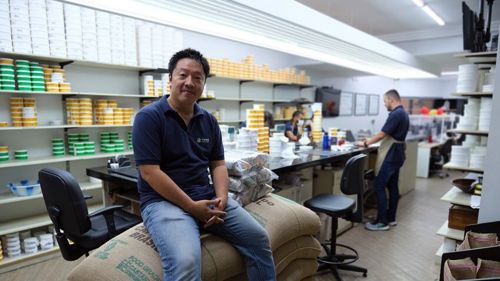
Alexandre Chen is head of the coffee division at COFCO International, which handles 120 million kilograms of coffee from Brazil per year
Global opportunities
Chen joined COFCO International in 2017 as a senior trader and became head of the coffee division in Brazil the following year. His team originates coffee from the major growing areas in Brazil, both Arabica and Conilon varieties, covering buying, selling, hedging, checking payments and delivering within the schedule. They sell mostly to roasters and trading companies in the U.S. and Europe. Japan is a significant established market in Asia and China has substantial potential.
COFCO international is ranked in the top 10 coffee traders in Brazil, handling a total volume of up to 120 million kilograms per year. Chen’s team works with about 500 suppliers and more than 50 buyers.
“China consumption is already bigger than in several major countries. But it remains like an uncut gemstone, and everybody expects it to explode sooner or later due to the size of the population,” Chen says.
There are significant opportunities for COFCO International with coffee in Brazil, which is the world’s largest producer. It is a growing company there with several types of operations, and Chen’s team knows the importance of being closer to the farmers and cooperatives.
“Our work here is to have enough people to reach the farmers and cooperatives directly, rather than communicating through representative offices up country. This means expanding the team and our range and creating new operations,” Chen says. “As a coffee company, we are still considered a newcomer here by our competitors, but we are growing in Brazil every year and we have big plans for the next five, 10 and 20 years.”
A bigger team means more direct contact with producers rather than through brokers, improving the information on production coming in, which in turn provides more flexibility in dealing with customers in terms of the blend and quality that can be supplied. Chen’s department also works with many certified producers where the land is audited for sustainability issues such as deforestation, labour rights, river waste and socio-environment topics, which consumers are increasingly demanding and willing to pay a premium for.
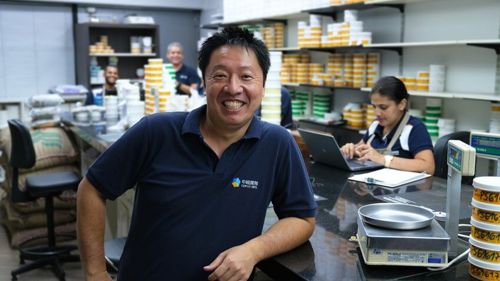
Chen's team originates coffee from the major growing areas in Brazil, covering buying, selling, hedging, checking payments and delivering within the schedule. They sell mostly to roasters and trading companies in the U.S. and Europe.
Blending to match demand
On a normal day, Chen and his team assess the schedule and their warehouses, how many load and discharges are expected and how many containers will be shipped. It is particularly important to keep close tabs on the schedule and deliveries. In today’s environment the logistics and prices can change rapidly during periods of volatile demand and future markets.
A key task is checking the quality of coffee, ensuring that what has been bought is the same as what comes into the warehouse. To achieve this, the quality team works with samples both at the source and at the warehouses.
“We have to pick different coffees to be in our inventory to cover what our customers want, then we blend it in the warehouse to match demand,” Chen says.
One of the first things Chen did as head of the department was to bring the whole team together, with quality alongside commercial. This means improved communications, in terms of ensuring quality and sourcing, selling and price all the way from the buying points to the destination teams.
That flow of information has become even more important with the changing demand picture caused by Covid-19. This has made logistics of ports and moving stocks more complicated and caused volatility in demand because of significantly reduced consumption of coffee in offices, restaurants, cafes and petrol stations. Now as the pandemic seems to be easing and restrictions lifting, demand is improving again.
“You have to know everything from the beginning to the end of the chain – production, harvest, warehouse and all the way to container, shipping and arrival at destination,” Chen says. “There’s no best coffee in the world. It depends on the consumer’s taste and the flavour that they like. It’s the interaction with clients that makes coffee different from other commodities.”
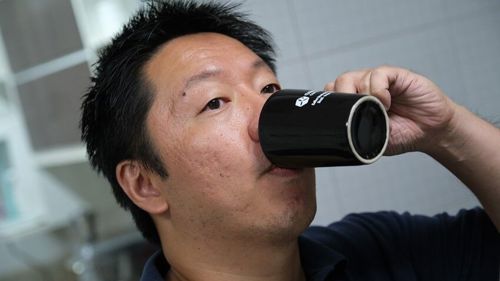
From lab to home tasting
For Chen, tastings with customers and in the lab are some of the most enjoyable parts of his job.
The lab – where the team assess the coffee, in terms of colour of roasted beans, its growth and size – is located in the COFCO International office in Santos, Brazil’s largest port which has a long history of coffee trading and exports. The lab works with tin or plastic cans with different samples and sizes of beans. They then grind the beans and pour in the water, smell the coffee, let it sit until it cools off a bit and then, finally, slurp.
“We normally do 10 cups for each sample, and there can be 100 samples in a day. It’s quite a lot!” Chen says. “Visiting customers on tour is also a lot of fun. We take some samples and someone from the quality team along with our destination team sit and discuss what is desirable in the coffee and what is not. It’s great to have that direct interaction over the product. We want to deliver consistency in the quality,” he explains.
That relationship with coffee doesn’t just stop at the end of the working day.
“During weekend I like filtered coffee, and during the week espresso is my favourite, largely because it’s quick to prepare. I like to select different flavours and I like to test different qualities with my parents and friends. Their feedback on what they perceive to be good or not is, a lot of the time, almost in the opposite direction to the international buyers. So more often than not they say: ‘This is not good’, just to hear back from me: ‘This is the best of the best!’. So there is some family disagreement and discussions throughout the afternoon,” Chen says, with a smile on his face.
“For us it’s non-stop. We’re always talking about coffee and it’s a bit of an addiction. Fortunately, even if I drink a coffee at 10pm I can still sleep.”
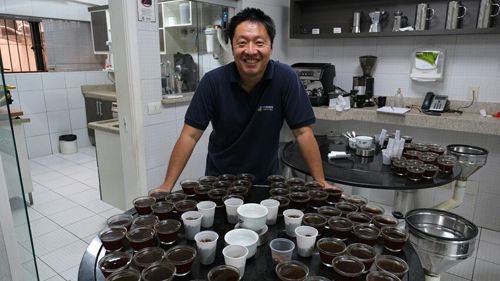
Tastings in the lab are one of the best parts of the for Chen. Here, the team assess the coffee in terms of colour of roasted beans, its growth and size.
